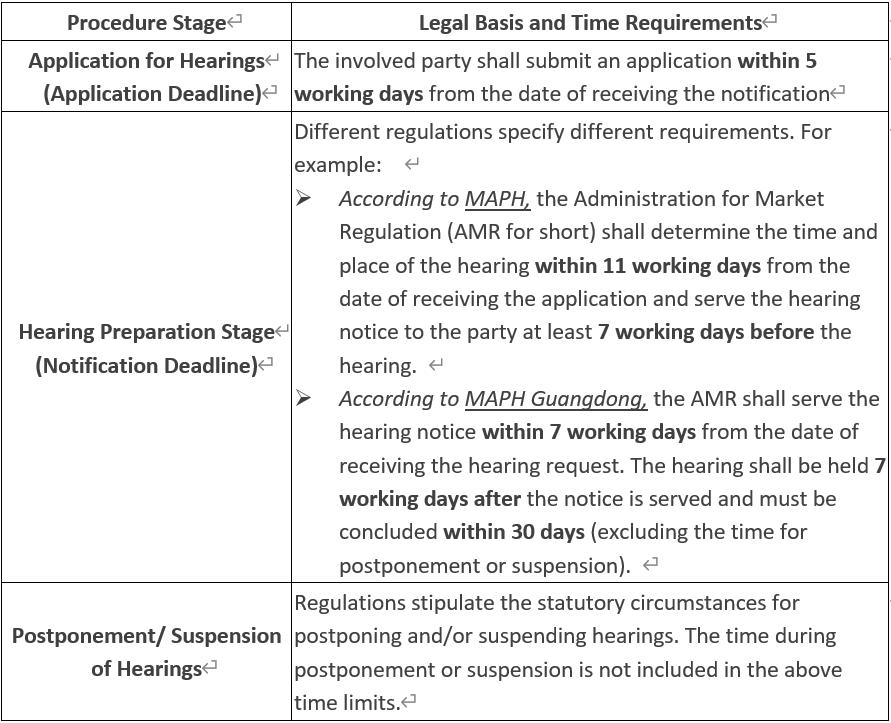CHANG TSI
Insights
Hearing is a core procedural right granted to involved parties by the Chinese Administrative Penalty Law. Especially in cases involving substantial fines, qualification restrictions, suspension of production or business operations, and other significant rights and interests, administrative authorities shall inform the parties of their right to request a hearing. This article, drawing on the Chinese Administrative Penalty Law, Regulations on Administrative Penalty Procedures of the Administration for Market Regulation, Measures for Administrative Penalty Hearings of the Administration for Market Regulation (MAPH for short), Implementation Measures for Administrative Penalty Hearings of Guangdong Province (MAPH Guangdong for short), and our practical experience, systematically outlines the legal key points and practical operational strategies of hearing procedures in administrative penalty cases, providing professional guidance for enterprises.
1. Circumstances Requiring Notification of Hearing Rights
According to Article 63 of the Chinese Administrative Penalty Law and related regulations, administrative authorities shall inform the involved parties of their right to request a hearing before imposing the following administrative penalties. If the involved party requests a hearing, the administrative authority shall organize the hearing:
Economic Penalties: Significant fines, confiscation of substantial illegal gains, or confiscation of high-value illegal property.
Specific standards vary according to different regulations. For instance, MAPH stipulates that fines or confiscation of illegal gains and property valued at CNY 100,000 or more for enterprises, or CNY 10,000 or more for individuals, trigger the hearing requirement. In Guangdong Province, regulated by MAPH Guangdong, the standards are CNY 100,000 or more for enterprises and CNY 5,000 or more for individuals.
Qualification Restrictions: Lowering of the qualification level or rescission of a permit.
Prohibition from Operations: Orders for the suspension of production or business, closure, or restriction on employment.
Catch-all Clause: Other heavier administrative penalties, as well as other circumstances stipulated by laws and regulations.
2. Cost for Hearings
The involved party shall not bear the expenses of the hearings arranged by the administrative authorities.
3. Practical Tips
If the proposed administrative penalty falls within the scope of requiring a hearing but the administrative authority fails to inform the involved party of their right to request a hearing, the party can claim that the administrative penalty procedure is illegal. For example, if an AMR intends to impose a fine of CNY 160,000 on a company, they shall inform the party of their right to a hearing. If the AMR fails to fulfill this obligation, the involved party can claim procedural illegality.
1. Key Time Points

2. Legal Consequences of Violating Time Requirements
If the administrative authority fails to organize the hearing within the prescribed time limits, it may be deemed a procedural violation, potentially leading to the revocation of the penalty decision.
1. Pre-hearing Preparation Strategy
2. Key Points for the Hearing Session
(1) Breakthrough Points in the Cross-Examination Stage
(2) Statement Logic in the Debate Stage
3. Notes on Signing the Hearing Record
Review and check the hearing record carefully. Sign or seal it upon confirmation of its accuracy. If there are any objections to the record, submit a written explanation and request it to be included in the case file for future reference.
1. Issuance of Penalty Decision
The administrative authority shall make a decision based on the hearing record and the opinions and suggestions presented in the hearing report. Evidence that has not been cross-examined during the hearing cannot be used as the basis for the final decision.
Pathways for Rights Relief against Administrative Penalties
2. Supplementary Investigation
If further investigations are required after the hearing, the administrative authority shall conduct supplementary investigations.
3. Second Hearing
If new evidence that may have a substantial adverse impact on the involved party emerges after the hearing, the administrative authority shall organize another hearing.
1. Establishing an Internal Early Warning Mechanism
2. Evidence Management Before the Hearing
3. Risk Control After the Hearing
The administrative penalty hearing is not merely a formality but a right guaranteed by law to the parties involved. By well understanding the time requirements, deeply participating in evidence cross-examination and debates, and promptly initiating legal relief, enterprises can maximize the protection of their legitimate rights and interests. For procedural violations by administrative authorities, lawyers should uphold professional ethics and assist involved parties in achieving rights balance and fair relief according to the law.


